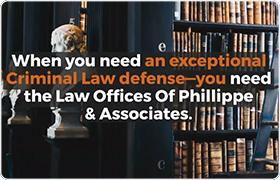Port Isabel RICO Act Lawyer, Texas
Sponsored Law Firm
-
 x
x

Click For More Info:
-
The Law Office Christopher Phillippe
104 North Express Way Brownsville, TX 78521» view mapCriminal Defense Law Helping Those Facing Difficult Times
We are confident in our ability to resolve difficult legal issues, and we will use our years of experience to represent your best interests.
800-659-6781
Not enough matches for Port Isabel RICO Act lawyer.
Below are all Port Isabel Criminal lawyers.
Christopher Lee Phillippe
✓ VERIFIEDDivorce & Family Law, Bankruptcy & Debt, Estate, Criminal, Accident & Injury
Mr. Phillippe has been licensed to practice law in the state of Texas since 1983. He helps his clients with Family Law, Accident & Injury, Criminal, B... (more)
Albert Lee Rodriguez III
Criminal, Divorce & Family Law, Medical Products & Devices, Divorce
Status: In Good Standing
FREE CONSULTATION
CONTACTEdward Michael Rodriguez
Litigation, Oil & Gas, Criminal, Commercial Bankruptcy, Personal Injury
Status: In Good Standing Licensed: 30 Years
Francisco Javier Orozco
Litigation, Criminal, Insurance, Credit & Debt
Status: In Good Standing Licensed: 11 Years
Michael Rodriguez
Complex Litigation, White Collar Crime, Civil Rights, Products Liability
Status: In Good Standing
Robert Louis Guerra
Insurance, Litigation, Personal Injury, Criminal
Status: In Good Standing Licensed: 22 Years
Ediberto Jose Trevino
Public Utilities, Family Law, Criminal, Personal Injury, Immigration
Status: In Good Standing Licensed: 35 Years
Gary Armand Ortega
Immigration, Family Law, Criminal, Personal Injury
Status: In Good Standing Licensed: 36 Years
FREE CONSULTATION
CONTACT Christopher Phillippe Brownsville, TX
Christopher Phillippe Brownsville, TX Practice AreasExpertise
Practice AreasExpertise

